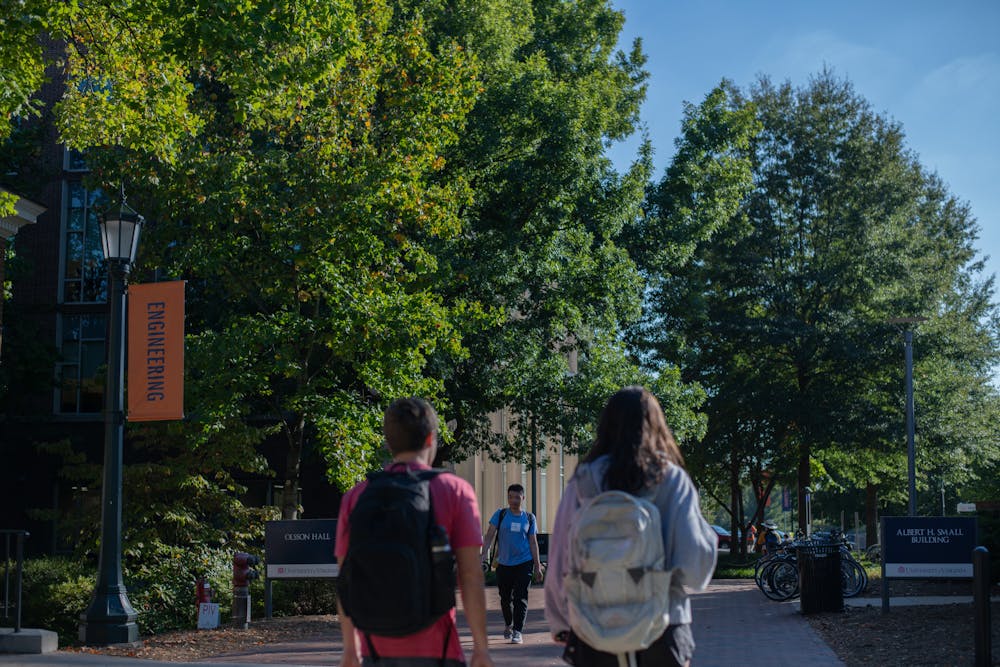A new advising plan for first-year students has been implemented at the School of Engineering this year to improve upon the current embedded advising program. Under the new system, students will take foundational engineering courses over a full year with their advisor as their instructor, someone who is also a faculty member within the School of Engineering.
First-year Engineering students will take a sequence of courses titled “Engineering Foundations” throughout their first year. These courses will be taught by a team of six advisors who will focus solely on advising the students in their classes. Classes will be capped at 48 students per section, and each advisor will have around three groups of students. The classes will meet twice a week throughout the year.
William Guilford, associate dean for undergraduate affairs for the School of Engineering, said this “embedded” model brings more consistency to the quality and frequency of advising. Guilford has served as an academic advisor in the past for these courses.
“It [will] definitely help with the social aspects of these courses,” Guilford said. “Having taught a pilot myself, when the students know you're their academic advisor, and they know that you are there, not just to teach them, but to support them — that makes a palpable difference in the classroom.”
Revamping undergraduate student advising has long been central to the University’s 2030 plan — last month, the Board of Visitors discussed progress made in both the Engineering School and the College to continue strengthening advising.
In past years, first-year students took a one semester-long course in the fall titled “Introduction to Engineering” with their advisor. Advisors included members of the Engineering faculty from around the school. After declaring a major in the spring of their first year, students received a new advisor specific to their department within the school.
Though the new expanded program had pilot phases during the past two years, this year will mark the first full-scale implementation, with first-year students taking the two engineering foundations courses over a full academic year as opposed to one semester.
This year’s new team of advisors, a combination of new faculty and faculty already at the University, will only instruct first-years in engineering foundations courses. The advisors underwent training this summer to prepare them for the role. Throughout this year, they will continue to undergo monthly training surrounding advising and teaching their introductory courses.
Leyf Starling, First Year Engineering Center lecturer and an instructor on this team, said the training was primarily devoted to developing curricula for these courses and better understanding the University’s network of resources. According to Starling, continuous training throughout the year will enhance the program’s success.
“We have weekly meetings where we will talk about advising issues and I feel like we have incredible support,” Starling said. “If any questions come up and we don't know the answers, then we can help find the answers.”
Another advisor who participated in this training, Engineering Associate Prof. Esther Tian, said that students have received the new program positively, aligning with the excitement and hard work put in by advisors.
“Seeing the excitement in the classroom, and then the connection they have already started [forming] among themselves, I think this is really something good,” Tian said.
Discussions surrounding these changes began in 2019 but implementation was delayed by the onset of the COVID-19 pandemic, Guilford said. After returning in person plans were made to implement them during this academic year.
First-year Engineering student Albert Sein said advisors who instruct courses often gain a more detailed understanding of individual students’ needs.
“I think it's really helpful to have [my advisor] as a professor because she gets to know the type of student that you are and your strengths and weaknesses because she’s grading your work,” Sein said.
The School of Engineering will continue to build upon other facets of the embedded advising model, which includes an Assistant Dean of Students and Center for Diversity in Engineering, who specifically serve Engineering students.
In recent years, Engineering has also added two embedded Counseling and Psychological Services counselors for its students, as well as a specialist from the Student Disability Access Center, who focus on fulfilling the needs of students within the school.
Guilford said stronger advising supports overall learning within the Engineering school. The advising classes offer a chance for instructors to work hands-on with students through projects that introduce both engineering concepts and interpersonal connections.
“You're able to explore a lot of different things in a very simple format and the very first week of class, when everyone's just kind of still trying to figure out how to find a classroom,” Guilford said.







